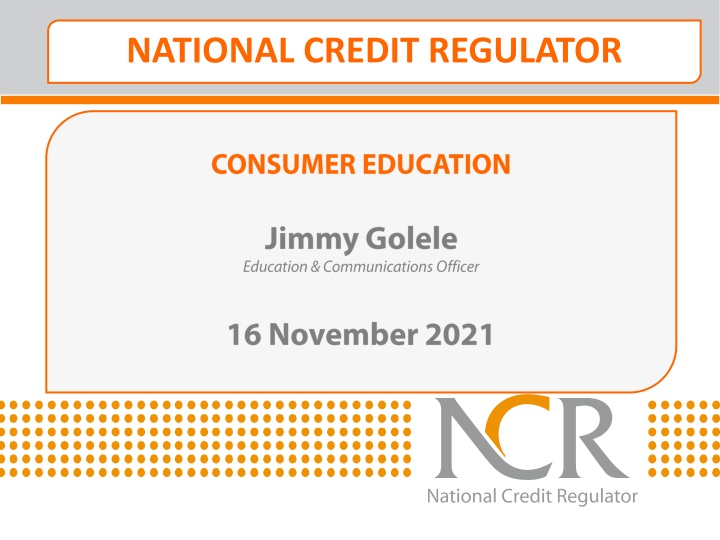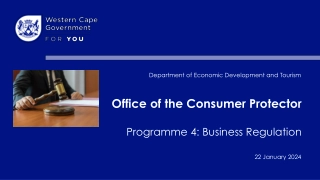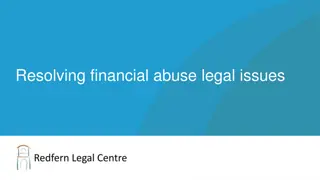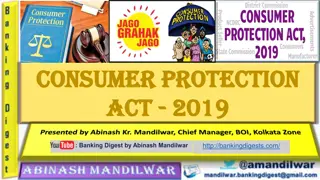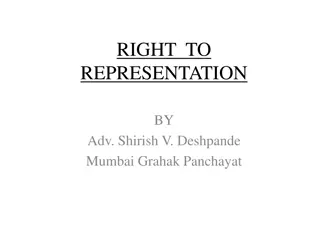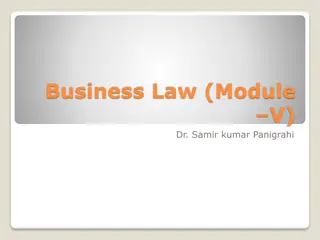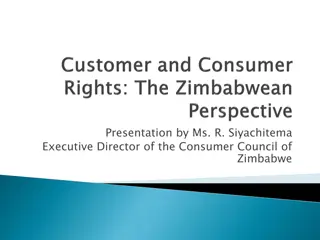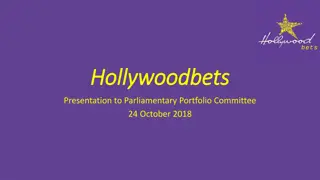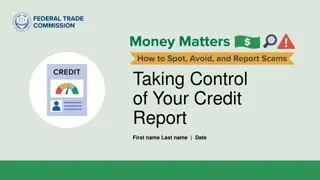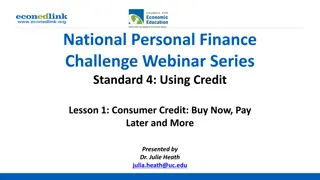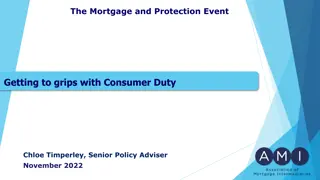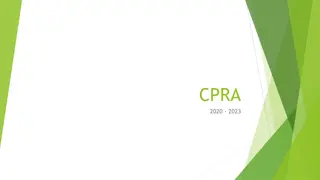National Credit Regulator and Consumer Rights
The National Credit Regulator (NCR) was established in June 2006 to monitor industry players, enforce the National Credit Act, and protect consumer rights. Consumers have rights to non-discriminatory credit, information disclosure, and more. Learn about good and bad debt, costs of credit agreements, statistics on consumer debt, and over-indebtedness.
Download Presentation

Please find below an Image/Link to download the presentation.
The content on the website is provided AS IS for your information and personal use only. It may not be sold, licensed, or shared on other websites without obtaining consent from the author.If you encounter any issues during the download, it is possible that the publisher has removed the file from their server.
You are allowed to download the files provided on this website for personal or commercial use, subject to the condition that they are used lawfully. All files are the property of their respective owners.
The content on the website is provided AS IS for your information and personal use only. It may not be sold, licensed, or shared on other websites without obtaining consent from the author.
E N D
Presentation Transcript
NCR established in June 2006 in accordance with the National Credit Act (NCA) to: Ensure registration of industry players: ADRs, PDAs, CP, CB and DC and monitor their conduct. Educate and create awareness of the protection offered by NCA Receive and investigate complaints, Enforce the act and take action against contravention of the NCA 2
CONSUMER RIGHTS Right to apply for credit free from direct or indirect discrimination; Right to disclosure of information; Right to information in an official language that is simple, plain and understandable; Right to access and challenge credit records and information held by a CB; Right to confidential treatment of personal information; Right to receive regular statements; Right to reasons for credit being refused; The right to assistance when over- indebted; Right to automatic removal of adverse credit information. 3
GOOD DEBT Necessary debt is incurred when you borrow money to purchase essential items such as education/studies, house, business, etc. BAD DEBT Unnecessary debt is usually taken on to finance something that you don t really need or that you should be able to pay for in cash if you budget properly (luxury items). 4
We use it but do we understand it? The following costs may be levied under a credit agreement: Interest Initiation fees Monthly service fees Credit Life Insurance Other costs: Default charges Collection Costs 6
STATISTICS - CCMR/CBM: June 2021 CREDIT ACTIVE CONSUMERS 26.22m CONSUMERS IN GOOD STANDING 16.04m CONSUMERS IN THE RED (impaired) 10.07 m TOTAL CONSUMER DEBT R2.04 trillion
OVER-INDEBTEDNESS What is it? A consumer is considered to be over-indebted if money available after payment of essential expenses is not enough to pay all other debts. 8
Lack of Knowledge Over -Indulgence living in the first class lounge Ignorance of financial products Lack of proper planning Social pressures peer, family Change in circumstances divorce, retrenchment, death, etc. Reckless lending Economic upswing increasing interest rates GREED & BLIND FAITH 9
A consumer is over-indebted when he/she: Borrows money to pay other loans; Skips payments on some accounts in order to pay others; Receives letters of demand and/or summons from creditors; Is thinking of being placed under debt administration/debt counselling; Has judgments passed against him/her; Is always absent from work, especially towards month end; Regularly feels emotionally stressed about money matters; Is regularly losing money to rip-offs and scams. 10
Employment exclusion in the financial sector Stress Under-performance Unhappiness Absenteeism Substance abuse 11
Can over-indebtedness trigger other addictions One addiction has the potential to trigger another addiction overindebtedness problem gambling FINANCES ARE IN A STATE OF DISORDER MAXED OUT CREDIT CARD and CREDIT LINES UNPAID BILLS EMOTIONAL AND PHYSICAL ABUSE OF FAMILY/CHILDREN/SPOUSE SELLING POSSESSIONS TO FINANCE ADDICTIONS OTHER UNDESIRABLE TRAITS MAY BE TRIGGERED: NEW ADDICTIONS (DRUGS) and INCLINATION TOWARDS CRIMINAL ACTIVITIES 12
LIVE WITHIN YOUR MEANS SPEND LESS THAN YOU EARN YOU CANNOT BORROW YOUR WAY OUT OF DEBT LIFESTYLE CHANGE / REVIEW NO IS AN ANSWER 13
DEBT RELIEF MEASURES DURING COVID-19 PANDEMIC Credit life insurance Debt counselling/review Surrender of goods 14
ACCESSING DEBT REVIEW There are 3 ways in which a consumer can access DC services 1. Voluntarily (s ) 2. Referral by a CP: CP must take certain steps prior to taking legal steps against a consumer, including informing him/her that they have a right to approach DC to ask for assistance (s129) 3. Referred by the court (s85) 15
DC CONTINUED Once a consumer is placed under DR, a CP may not take any legal action against the consumer; Once under DR, consumer may not apply for credit, except a CONSOLIDATION LOAN; Clearance certificate issued upon settling all debts. 16
CONTACT ANY OF THE BUREAUS BELOW TO GET YOUR FREE CREDIT REPORT TransUnion (previously ITC) Call Centre: 0861 482 482 / www.mytransunion.co.za Experian South Africa Call Centre: 0861 10 56 65 / www.creditexpert.co.za XDS Call Centre: 0860 937 000 / www.xds.co.za Consumer Profile Bureau Call Centre: 010 590 9505/ www.cpbonline.co.za Vericred Call Centre: 087 150 3601 / www.vccb.co.za 17
A prescribed or old-debt is when: For the past 3 consecutive years the credit provider has not summonsed you for this debt; For the past 3 consecutive years you have not acknowledged the debt by verbal or written communication; You have neither made any payment or promise of payment towards the outstanding debt. The selling and/or collection of prescribed (old) debt is PROHIBITED. 18
TO ASK YOURSELF Where am I today? Where do I want to be tomorrow? How do I get there? 19
? Q A
FOR MORE INFORMATION Toll share 0860 627 627 JGolele@ncr.org.za workshops@ncr.org.za or Enquiries: info@ncr.org.za www.ncr.org.za 21
Thank you! 22
